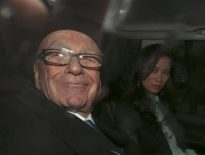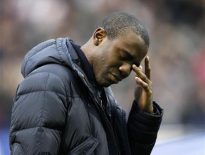By Chris Buckley and Andrew Quinn
BEIJING (Reuters) – Blind Chinese
dissident Chen Guangcheng appealed on Thursday for asylum in the United States, throwing into doubt an agreement used to coax
him out of hiding in the U.S. Embassy in Beijing and fanning U.S.-China tensions at a sensitive time.

embassy in Beijing April 30, 2012. The United States faces a tense week in China as high-level talks on trade and global hot
spots like Iran and North Korea open in the shadow of a blind Chinese activist's bold escape from house arrest to seek
U.S. protection in Beijing. REUTERS/Petar Kujundzic
The standoff appears
particularly troublesome for the Obama administration, with Chen saying he now fears for his and his family’s safety if he
stays in China, as was planned under the deal that Washington called a good outcome for the dissident.
China’s
Foreign Ministry declined to comment on Chen’s request to leave the country and repeated its criticism of the way the United
States had handled the issue as “unacceptable”.
Chen, a self-taught legal activist, left the U.S. Embassy on Wednesday
and is now under Chinese control in a Beijing hospital. He had taken refuge at the U.S. mission for six days after escaping
house arrest and left after U.S. officials assured him that Beijing had promised to improve his circumstances.
But
Chen said on Thursday by telephone from hospital, where he was escorted by U.S. officials and was being treated for a broken
foot, that he had changed his mind after speaking to his wife who spoke of recent threats made against his family.
“I
feel very unsafe. My rights and safety cannot be assured here,” he said. His family, who were with him at the hospital,
backed his decision to try to reach the United States, he added.
The activist, citing descriptions from his wife, Yuan
Weijing, said his family had been surrounded by Chinese officials who menaced them and filled the family home. Chen, from a
village in rural Shandong province, has two children.
“When I was inside the American Embassy, I didn’t have my
family, and so I didn’t understand some things. After I was able to meet them, my ideas changed.”
A senior U.S.
official later said the United States was seeking to clarify Chen’s wishes and continued to discuss his fate with the
Chinese government.
“When we feel that we have a clear view of what his final decision is, we will do what we can to
help him achieve that,” the official said.
The timing of the Chen case comes at a fragile time for both nations: U.S.
President Barack Obama will be sensitive to any criticism of the handling of Chen in the run-up to a November presidential
election and China is struggling to push through its own leadership change late this year.
That carefully
choreographed transition has already been wrong-footed by the downfall of ambitious senior Communist Party official Bo Xilai
after he was caught up in a scandal linked to the apparent murder of a British businessman.
U.S. Secretary of State
Hillary Clinton found herself in the eye of the diplomatic storm on Thursday, turning up for the opening of annual bilateral
talks in Beijing which have been overshadowed, but not derailed, by the Chen case.
She used the occasion to urge China
to protect human rights but made no specific mention of Chen, whom she had spoken to on Wednesday after he left the
embassy.
“Of course, as part of our dialogue, the United States raises the importance of human rights and fundamental
freedoms,” Clinton said. “We believe all governments have to answer our citizens’ aspirations for dignity and the rule of
law and that no nation can or should deny those rights.”
Despite Chen’s change of heart about staying in China, it
was unclear if he would be able to travel to the United States.
U.S. officials appeared no longer to be with him on
Thursday, with the dissident saying he had still not had an opportunity to explain his change of heart to the U.S.
side.
“I hope the U.S. will help me leave immediately. I want to go there for medical treatment,” Chen said from the
hospital, where a pack of camera crews and reporters was waiting outside, kept away from the entrance by
police.
U.S.-CHINA DEAL BREAKS DOWN
Washington had hoped its deal with Beijing over Chen would defuse the
crisis, with both Clinton and U.S. Treasury Secretary Timothy Geithner in the Chinese capital for this week’s talks – in
which the United States will aim to secure more cooperation from China on trade and international flashpoints such as North
Korea, Iran and Syria.
Under the deal, according to U.S. officials, Chen and his family would have been relocated
within the country in safety and he would have been allowed to pursue his studies.
But Chinese authorities have taken
a tough tone, criticising what they called U.S. meddling and demanding an apology for the way U.S. diplomats handled the
case.
Chinese President Hu Jintao made no mention of the Chen case in his remarks to the U.S.-China talks but stressed
that the two nations needed trust.
“It is impossible for China and the United States to see eye-to-eye on every issue,
but both sides must know how to respect each other,” he said.
Earlier, in comments aired on CNN, Chen said: “I would
like to say to President Obama, please do everything you can to get our family out.”
DOUBTS AND QUESTIONS
Chen,
40, is a legal activist who campaigned against forced abortions under China’s “one-child” policy. He escaped 19 months of
house arrest, during which he and his family faced beatings and threats, late last month.
U.S. officials had said Chen
left the embassy of his own free will because he wanted to be reunited with his wife and children. They said he wanted to
remain in China and never asked for asylum.
Chen’s dramatic escape from house arrest and his flight last week to the
U.S. Embassy have made him a symbol of resistance to China’s shackles on dissent, and the deal struck by Beijing and
Washington would have kept him an international test case of how tight or loose those restrictions remain.
Now,
however, his change of mind throws not only his own future into doubt, but also raises questions about the wider U.S.-China
relationship.
It could also prove politically costly for Obama, who has already been accused of being soft on China by
Republican presidential candidate Mitt Romney and who could now face further criticism over Chen’s case.
What
initially appeared to be a foreign policy success for the Obama administration could quickly turn into a
liability.
(Additional reporting by Ben Blanchard, Don Durfee, Lucy Hornby and Michael Martina in Beijing; Brian
Rhoads, James Pomfret and Tan Ee Lyn in Hong Kong; and Arshad Mohammed and Paul Eckert in Washington.; Writing by Mark
Bendeich; Editing by Jonathan Thatcher and Nick Macfie)





